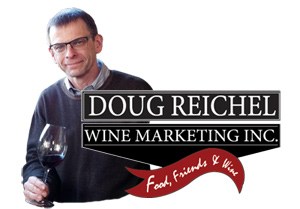We enjoyed one of my favourite Chilean wines, finished half the bottle, put the cork in it and left it upright in the basement. Having completely forgotten about the bottle, I discovered it one week later. "What an idiot!" I thought, "You've wasted a good bottle of wine." As with most wines that have been open a few days, it would be molasses-like on the nose and faded in taste, almost vinegar tasting. But when I removed the cork, and sampled the wine I was surprised to find that not only was it none of what I expected, it was truly elegant, rounder and fuller in the palate, beautifully fruity and accessible. Wow. I contacted the winery, relayed the incident and asked how and why this was possible. I'll never forget Javier Paredes' response: "Doug, it's the health of the grapes."
As with many things, where and how something starts often impacts where and how something ends or becomes. We see this with people, with ourselves: early childhood experiences often influence our angles on life - for good or ill - into our adult years. As one of my professors said: "Much loved children love much."
So, too, with wine. The way the vines are treated in the vineyard will impact the wine made in the winery. While good grapes do not guarantee that the winemaker will produce a good wine - he or she could mess it up - it is certain that you cannot get a good wine from mediocre grapes. Winemakers use more science and less guesswork than ever before, with impressive results. And many winemakers around the world are becoming more and more committed to sustainable farming practises knowing that healthy grapes and the future of winemaking go hand in hand. The very best wines come from grapes that have not been overly chemically treated in the vineyard or chemically manipulated in the winery. Grapes that become dependent on chemicals in the vineyard loose something of their best features in the bottle.
One winemaker friend of mine used to use "conventional" practices of regularly spraying his vines with a cocktail of chemicals until he discovered that one of the chemicals was the same one used by the American military in their stockpile of chemical weapons in the event of chemical warfare during the first Gulf war. He decided there and then, and against the popular practise of his peers at that time, to pursue organic agriculture for long-term sustainability.
Raise to your health, a glass of healthy wine.
Enjoy.
Doug Reichel
Visit: FineWinesSask.com
Doug's Wine Picks of the Week
Torreon de Paredes Reserve Sauvignon Blanc 2012 - Chile ($16.95 - ID#5795). Winemaker: Alvaro Paredes. Description: All the Torreon de Paredes wines come from their own estate vineyards. They were among the first Chilean vineyards to become ISO 14001 certified for environmentally-friendly land use. And the results are in the glass. Handpicked grapes from older vines and then fermented in Stainless steel. This is actually 92 per cent Sauvignon and eight per cent Gewürztraminer - an amazing touch! On the nose: intense notes of grapefruit peel and tropical fruits. In the mouth: juicy and beautifully balanced with a refreshing crispness. Food pairing suggestions: Pork, lake & seafood, goat cheese and feta salads, to name a few.
Altos de Luzon 2007 - Spain ($28.21 - ID# 6371). Description: All Luzon wines are made from organic grapes from the south of Spain. A blend of very old vine Monastrell grapes (queen of the grapes in southern Spain), Cabernet Sauvignon and Tempranillo, matured in American and French oak for a minimum of 12 months. Serve or gift this when you want to impress your palate and everyone else's. A full-throttle, exuberant, dense black-red wine with beautiful aromas of smoky liquorice, black current and enchanting smoothness in the mouth. Food pairing suggestions: kabobs, paellas, red meats, bold cheeses.
All wines listed are available in Saskatchewan through your local government liquor store or rural liquor franchisee. If they don't have it in stock, request it by ID number, they'll bring it in.




